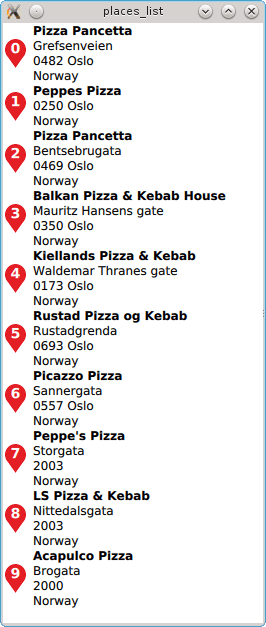
要运行范例从 Qt Creator ,打开 欢迎 模式,然后选择范例从 范例 。更多信息,拜访 构建和运行范例 .
The
Places List
example demonstrates how to search for a list of places in a certain area and displays the result using a
ListView
. In this particular case, a search for places associated with the term
pizza
的履行。
To write a QML application that will show places in a list, we start by making the following import declarations.
import QtQuick 2.0 import QtPositioning 5.5 import QtLocation 5.6
Instantiate a
Plugin
instance. The
Plugin
is effectively the backend from where places are sourced from. Depending on the type of the plugin, some mandatory parameters may be need to be filled in. The most likely type of
PluginParameter
are some form of service access token which are documented in the service plugin. As an example see the
HERE Plugin
documentation. In this snippet the
osm
plugin is used which does not require any further parameter:
Plugin { id: myPlugin name: "osm" //specify plugin parameters as necessary //PluginParameter {...} //PluginParameter {...} //... }
Next we instantiate a PlaceSearchModel which we can use to specify search parameters and perform a places search operation. For illustrative purposes, update() is invoked once construction of the model is complete. Typically update() would be invoked in response to a user action such as a button click.
PlaceSearchModel { id: searchModel plugin: myPlugin searchTerm: "pizza" searchArea: QtPositioning.circle(startCoordinate); Component.onCompleted: update() }
Finally we instantiate a
ListView
to show the search results found by the model. An inline delegate has been used and we have assumed that every search result is of
type
PlaceSearchesult
. Consequently it is assumed that we always have access to the
place
role
, other search result types may not have a
place
role
.
ListView { anchors.fill: parent model: searchModel delegate: Component { Row { spacing: 5 Marker { height: parent.height } Column { Text { text: title; font.bold: true } Text { text: place.location.address.text } } } } }
文件: